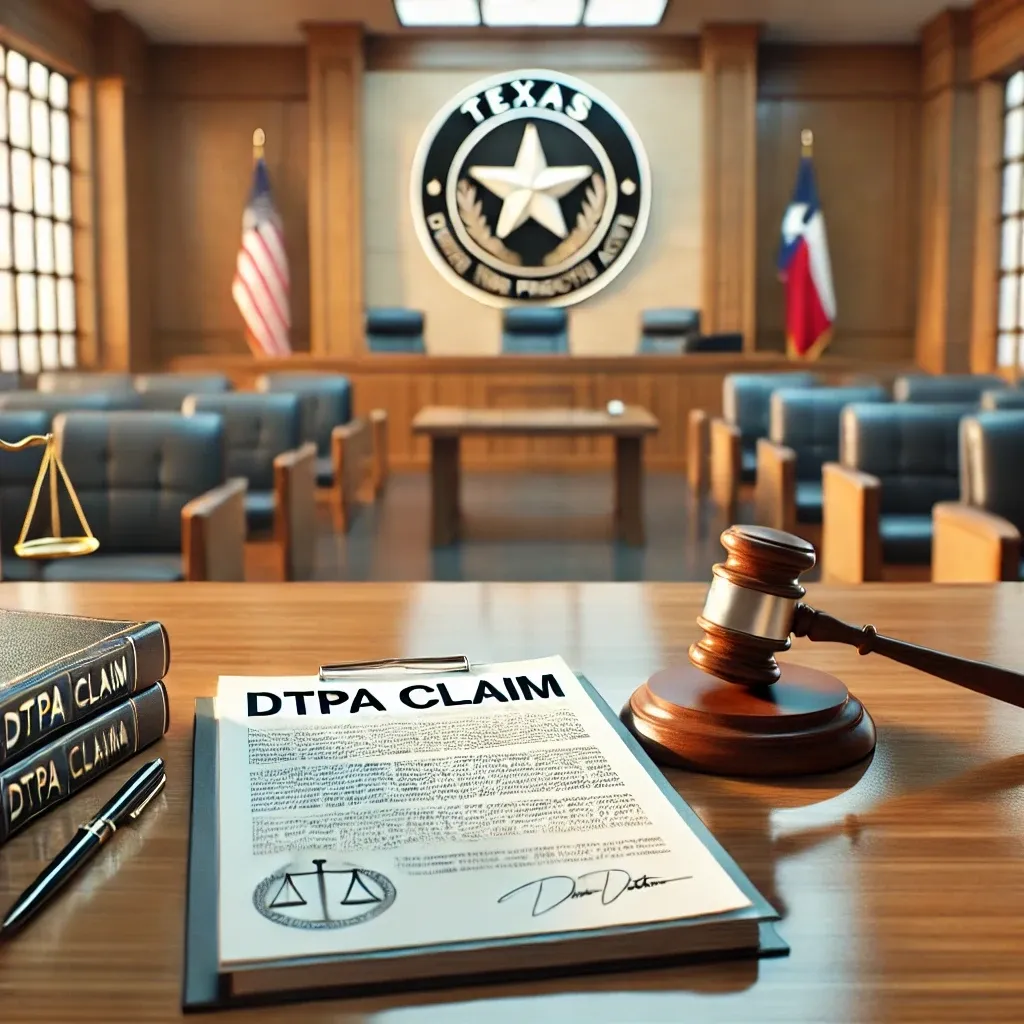What You Need to Know About the DTPA’s Treble Damages
Consumers in Texas are protected by one of the strongest consumer protection laws in the country: the Texas Deceptive Trade Practices Act (DTPA). This law was enacted to shield consumers from false, misleading, and deceptive business practices, unconscionable actions, and breaches of warranty. If you’re a Texas resident, understanding your rights under the DTPA is crucial for ensuring that businesses treat you fairly and honestly.
What is the Texas Deceptive Trade Practices Act (DTPA)?
The Texas Deceptive Trade Practices Act, found in Chapter 17 of the Texas Business and Commerce Code, is designed to protect consumers from a wide range of dishonest practices. It applies to any transaction involving goods or services, including sales, leases, and other forms of commerce. The DTPA covers many unfair or deceptive practices, such as:
- False Advertising: making false or misleading statements about a product or service.
- Bait-and-Switch Tactics: advertising a product at a low price to lure customers, only to push a more expensive item.
- Unconscionable Actions: taking advantage of a consumer’s lack of knowledge, ability, or experience to a grossly unfair degree.
- Breaches of Warranty: failing to honor written or implied warranties on products or services.
Under the DTPA, after consumers have provided proper notice to the seller or lessor of goods and services, consumers have the right to file a lawsuit if they have been harmed by any of these deceptive practices. Importantly, the DTPA not only allows consumers to recover economic damages but also, in some cases, “treble damages.”
What Are Treble Damages?
Treble damages are a form of punitive damages intended to deter wrongdoing. Under the DTPA, a fact-finder may award treble damages, which means that a consumer can receive up to three times the amount of their actual economic damages. However, treble damages are not automatically granted; they are only awarded under specific circumstances.
When Can You Claim Treble Damages?
To qualify for treble damages under the DTPA, a consumer must prove that the defendant acted “knowingly” or “intentionally.” Here’s what these terms mean:
- Knowingly: The business was aware that its conduct was false, misleading, or deceptive, but continued with the deceptive practice regardless. If the fact-finder finds that the defendant acted knowingly, it may award up to three times the amount of economic damages plus compensation for mental anguish.
- Intentionally: The business had the specific intent to deceive or mislead the consumer. If the defendant’s actions are found to be intentional, the court may award three times the amount of both economic damages and damages for mental anguish.
For example, if a consumer was misled into purchasing a defective car based on false statements by the dealership, and the dealership knowingly provided false information, the court could award treble damages.
The Texas Supreme Court has held that “[a] DTPA claim does not require that the consumer prove the [defendant] acted knowingly or intentionally. The DTPA requires that the consumer show that the misrepresentation was false and that the false misrepresentation was the producing cause of the consumer’s damages. A consumer is not required to prove intent to make a misrepresentation to recover under the DTPA.” Miller v. Keyser, 90 S.W.3d 712, 716 (Tex. 2002). Thus, even statements that the speaker did not know were false may support a DTPA lawsuit.
It is important to obtain a knowledgeable attorney, as many practitioners who do not specialize in this area tend to confuse “proximate” with “producing” cause. Producing cause is a much lower standard than proximate cause, making a DTPA case easier to prove as a matter of law.
Additionally, DTPA claims are ‘extra-contractual’ meaning that it does not matter if there is a contract. This tends to cause confusion for unfamiliar practitioners as to whether or not a DTPA claim can be waived under the terms or regular disclaimers in contracts. As stated by the statute itself, unless both parties are represented by lawyers in the drafting of the original contract, the DTPA can not be waived! Even then, the disclaimer must meet additional qualifications to be valid. Therefore, a contract does not typically prevent a DTPA claim.
Example of Calculation Under the DTPA with Treble Damages:
The DTPA statute sets out a maximum cap on damages. The maximum under the statutory cap would be calculated as follows:
Economic Damages
+ Mental Anguish Damages (Calculated at 3x Economic Damages)
+ Multiplier (3x Economic Damages + 3x Mental Anguish Damages)
+ Attorney’s Fees and Court Costs.
= Total Award
For example, say that a consumer, Miss Doe, books a beautiful out-of-town wedding venue, represented to her in photographs and by the business owner to be in pristine condition, costing a total of $10,000 for her much anticipated wedding. Unfortunately for her, she arrives on the day of her wedding to find the venue is nothing as it appears in photographs; it is graffitied, defaced, and smells of sewage, making it impossible to have the event she had planned. Despite her heartbreak, the vendor refuses to refund her money. At trial, the fact-finder awards the maximum damages using the aforementioned calculation. (For simplicity sake, we will only include the original $10,000 economic damage of the venue cost and not additional costs that would be included for moving the venue.) This could result in a total award of:
$10,000 economic damages
+ $30,000 mental anguish damages (3x $10,000 economic damages)
+ $120,000 multiplier (3x $10,000 economic damages) + (3x $30,000 mental anguish damages)
+ $64,000 (40% attorney contingency fee, if this fee arrangement is chosen)
+ $1,000+ (court costs and fees)
= $225,000+ total award
Businesses are shocked to learn that a $10,000 mistake can result in such damages. It is much better to address a consumer’s DTPA claims within the first 60 days of the notice period than to allow these matters to go to trial with such exposure. However, these statutory damage awards are evidence of how seriously the Texas Legislature takes these types of deceptive trade practice injuries to consumers.
How to File a Claim Under the DTPA
If you believe you’ve been a victim of deceptive trade practices, you can file a claim under the DTPA. The process typically involves:
- Sending a Demand Letter: Before filing a lawsuit, the consumer must send a written demand to the business, outlining the complaint and the damages sought. The business has 60 days to respond and potentially settle the matter.
- Filing a Lawsuit: If the issue is not resolved, the consumer can then file a lawsuit in court. The case will be decided based on the evidence provided by both parties.
- Proving Your Case: To succeed, the consumer must show that the business engaged in a deceptive practice, that they suffered economic damages, and, if seeking treble damages, that the business acted knowingly or intentionally, which can be inferred by circumstantial evidence.
Protecting Your Rights
The DTPA is a powerful tool for consumers, but navigating the legal process can be complex. The Texas Deceptive Trade Practices Act provides protections for consumers, holding businesses accountable for deceptive and unfair practices. If you suspect you’ve been a victim of a deceptive trade practice, take action promptly to ensure your rights are upheld. Give us a call today to see how we can assist you.










